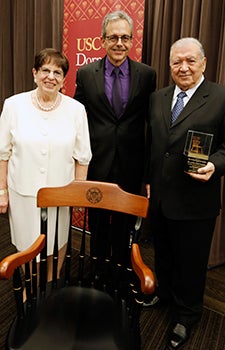The People’s Academic
At a ceremony honoring his installation as the inaugural holder of the Turpanjian Chair in Civil Society and Social Change, Professor Manuel Pastor made three pledges for how he will serve the USC — and greater Los Angeles — community in his new role.
The first pledge was to recognize what a privilege it is to represent the university.
“We have a responsibility to deliver scholarship of consequence to the world and understand that while we may be a private university, we are a public actor and a key part of the civil society we hope to study,” said Pastor, a professor of sociology and American studies and ethnicity at USC Dornsife.
The second pledge was to be rigorous in his work.
“We have a saying in the two research centers I currently direct: ‘If you uncover an interesting new trend in the data, you might be on to something, or you might just be wrong,” Pastor said.
Showing off his wit, he added, “Understanding if you’re right or wrong before you release the work, teaching students that accuracy is key, and convincing everyone that the term ‘nerd’ is just another way of saying ‘research god or goddess’ are crucial to the academic enterprise.”
Pastor’s third pledge was to “recognize that teaching and research about civil society needs to focus not just on big names and famous leaders — but on the everyday people and daily practices that stitch together society and make change possible.”
The ceremony, held Feb. 5 at the USC University Club on the University Park campus, brought together Pastor’s family members, donors Gerald and Patricia Turpanjian and their family, as well senior university administrators, faculty and staff. Also in attendance were representatives from service-oriented organizations, such as United Way, The California Endowment and the Los Angeles Office of Immigrant Affairs.

Patricia and Gerald Turpanjian receive a miniature replica of Pastor’s chair to commemorate their gift. From left: Patricia Turpanjian, Manuel Pastor, Gerald Turpanjian.
Pastor, who founded and directs USC Dornsife’s Program for Environmental and Regional Equity and the Center for the Study of Immigrant Integration, is a trained economist who conducts rigorous research to address significant social problems.
Turpanjian, who endowed the chair through the Turpanjian Family Educational Foundation, said he views Los Angeles as a potential laboratory for studying how to improve communities on national and international levels — an idea that melded perfectly with Pastor’s pursuits.
“The rapidly growing civil society sector is transforming the economic and social landscape of the 21st century,” Turpanjian said prior to the event. “As a USC alumnus I am proud that the university will be leading the way is this vital area of study. Developing a better understanding of the increasing impact of NGOs, nonprofits, philanthropy and volunteerism is a critical component of economic study and public policy.”
During the ceremony, USC Dornsife Dean Steve Kay reflected on the importance of Pastor’s work on a broader scale.
“Public service is projected to be 34 percent of America’s GDP by 2025,” Kay said. “By building relationships with people who live in Los Angeles, Manuel is able to analyze how society looks now — and how it will look in 5, 10, 50 years. Then he unites coalitions of people who use these findings to help promote economic growth across the board.”
Elise Buik, President and CEO of the United Way of Greater Los Angeles, remarked that Pastor’s approach to research is truly pioneering.
“Manuel has focused on the economic, environmental and social conditions that face low-income communities and on the social movements that are seeking to change those realities,” she said. “He knows that for research to effect change, one can not view people as research subjects — but instead must value them as experts at effecting the change that we all seek.”
USC Interim Provost Michael Quick expounded upon the relationship and values Pastor shares with Turpanjian.
“They have developed mutual respect for each other’s work and problem-solving approaches — active approaches that you might say, ‘just make sense,’ ” Quick said. “And in today’s world, where we see so little of that, things that make sense are, indeed, worth celebrating.”
Their similarities extend beyond academic interests.
Both Pastor and Turpanjian come from immigrant families. Turpanjian’s parents were survivors of the Armenian Genocide in 1915. He was born in Aleppo, Syria, and grew up in Beirut, Lebanon. He later went on to found Pacific Sales, which — before he sold it to Best Buy in 2006 — was the largest retailer of high-end kitchen and bath appliances in the United States. He is now the chairman and CEO of New Spark Holdings, Inc. and the president of Turpanjian Family Educational Foundation.
Turpanjian’s philanthropic ventures reach locally and internationally — from providing unwavering support to Armenian studies at USC to funding the construction of several schools in Armenia. He was also involved in bringing drinking water to the 3,000 residents of the Armenian town Hadrut by installing a new water distribution system.

USC Dornsife Dean Steve Kay (right) congratulates Manuel Pastor on his designation.
In his remarks, Pastor paid homage to Turpanjian’s humility.
“Jerry went to college later in life, indeed to USC,” Pastor said, “When he speaks, he will preface what he says by first indicating that he may not be a expert in the topic he is about to address, and then he will address it with precision and grace.”
Pastor said that Turpanjian’s ingenuity and grit remind him of his late father, who came to the United States with only a sixth-grade education — yet was the person who most influenced his passion for knowledge.
“My dad taught me that nothing is so difficult that you cannot learn it,” Pastor said. “And that propelled my life as an intellectual.”
Pastor has been a USC Dornsife faculty member since 2007. In 2012, he received the “Wally Marks Changemaker of the Year” award from the Liberty Hill Foundation. That year he published the book Just Growth: Inclusion and Prosperity in America’s Metropolitan Regions (Routledge), in which he uses quantitative and qualitative analysis to argue that economic growth is linked to equitable communities. He is currently at work on the follow-up book titled, Knowing Together; Growing Together.
Pastor served as a member of the Commission on Regions appointed by California’s speaker of the State Assembly, and as a member of the Regional Targets Advisory Committee for the California Air Resources Board. He is now on the Commission of the Parks Forward initiative which, this year, will begin to adopt a long-term plan for California’s state park system.
As the Turpanjian Chair, Pastor will host an annual symposium on civil society that will showcase the best research and practices of leaders engaged in social change. He will also begin a phased increase of his team, which will include recruiting a postdoctoral fellow.
To close the ceremony, Kay presented Pastor with a wooden chair inscribed with the university seal. The Turpanjians also received a miniature replica of the chair to honor their generosity.
Concluding his remarks, Pastor recounted a story about his mother, a Latina with Cuban roots, who found herself in the very back of the “white section” of a bus during World War II. An African American soldier — en route to bid farewell to his family before deploying overseas — attempted to get on. But the rear section was full.
“My mother insisted that he have the seat next to her,” he said. “I don’t know whether he came back safe from the war, but I do know that he went safely to his family — much to the chagrin of those seated several rows forward.”
From both his mother and father, Pastor absorbed the importance of wisdom and common decency.
“There are so many uncelebrated daily acts — those who read to children who are not their own, those who build affordable housing that they never live in, those who tilt the playing field to ensure opportunities for others,” he said. “That is the work of civil society and social change.”